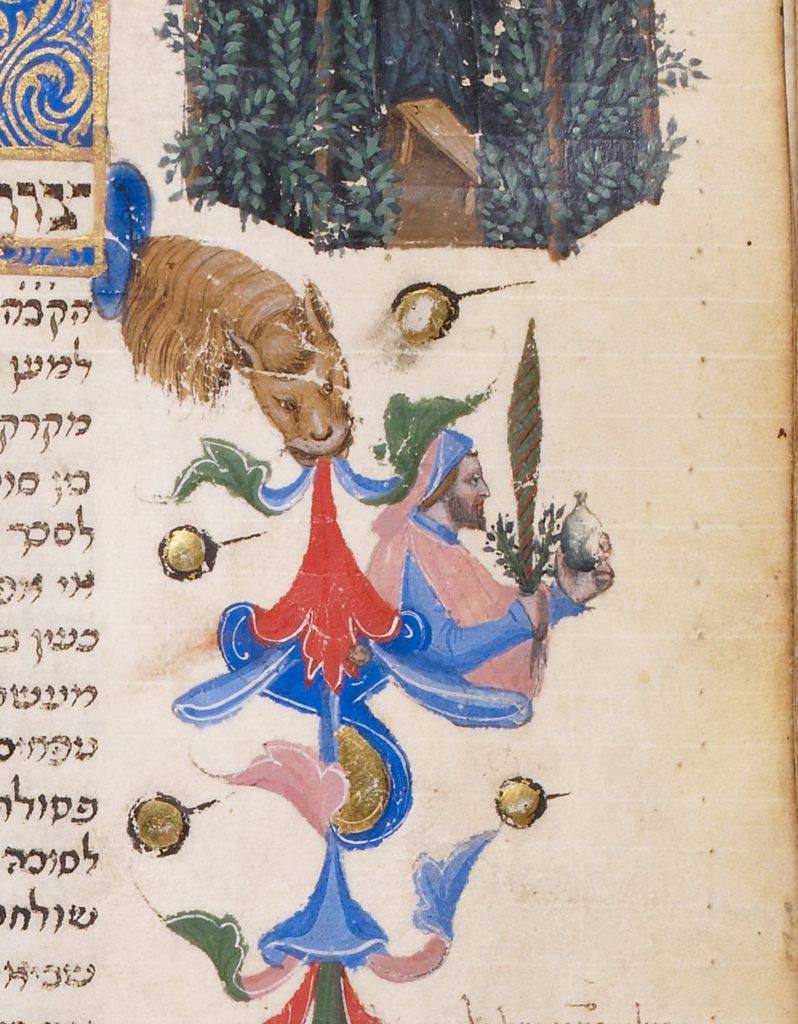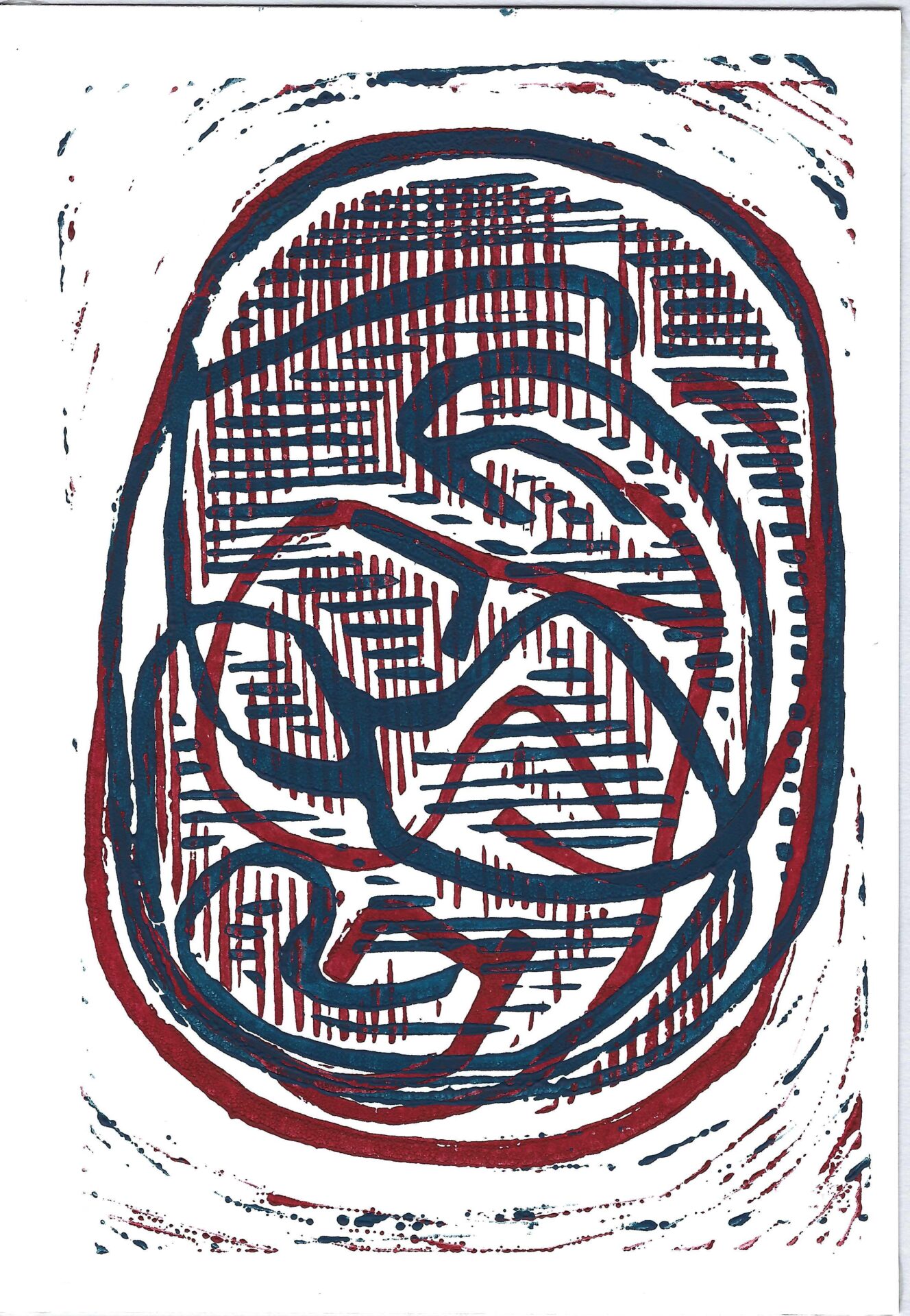Earlier versions of this have been posted at my original (pre-blog) site (first posted in 1997) and partially as “time for pruning” in 2011. A variant also exists as a printable PDF that is not currently available.
The days grow short, the moon fills and begins to wane.
The date clusters hang ready.
Come with me to the oasis.
The late summer harvest has begun.
I sort the fruit of my past year’s labor.
The fruit is full and sweet.
I look back on my year’s efforts with satisfaction.
The time for pruning has come.
Much dross weighs down my life.
Our lives are fleeting moments.
Teach us to number our days.
The Sukkah is a fragile booth.
During many years of desert life Sukkot housed our people.
The booth is temporary; our people lives in eternity.
My body is the fragile house of my consciousness.
My body is temporary.
My soul emerged from and will rejoin its Source.
May we continue to dwell together.
וּפְרוֹשׂ עָלֵינוּ סֻכַּת שְׁלוֹמֶךָ
Uf’ros aleinu sukkat shlomecha.
Spread over us the shelter of Your peace.
Our Sukkot are open to visitors.
Welcome to our lives.
Patriarchs and Matriarchs of our people.
Mixtures of Wisdom and Generosity.
Who do I welcome to my life?
Abraham & Sarah and Hagar
Isaac & Rebecca
Jacob & Leah and Rachel; Bilhah, Zilpah
Moses & Aaron & Miriam
Joseph & Asenath
David & Avigail
Our mothers and our fathers.
…and this year we welcome a pandemic ushpizin
as suggested by R. Alan Henkin
- Moses, of course who persuaded the Israelite slaves to shelter in place during the plague of the Death of the First-born (Ex. 11:1–12:36);
- Physician Abraham Catalano who in 1631 during the bubonic plague wrote his eyewitness account Olam Hafuch (An Upside-Down World);
- Rabbi Akiva Eger, who wrote movingly about the cholera pandemic of the 1830s;
- Rabbi Israel Salanter, who during the cholera epidemic of 1848 permitted people feeling weak to eat on Yom Kippur, going so far as to make kiddush and eat cakes himself;
- Rabbi Moise Berg of Albuquerque’s Congregation Albert who helped that city cope with the Spanish Flu pandemic of 1918;
- Dr. Jonas Salk who led the effort to develop the polio vaccine in the 1940s and 1950s;
- Dr. Charlotte Friend, who in the 1950s and 1960s proved that some cancers were caused by viruses.
בַּסֻּכֹּת תֵּשְׁבוּ, שִׁבְעַת יָמִים; כָּל‑הָאֶזְרָח, בְּיִשְׂרָאֵל, יֵשְׁבוּ, בַּסֻּכֹּת. לְמַעַן, יֵדְעוּ דֹרֹתֵיכֶם, כִּי בַסֻּכּוֹת הוֹשַׁבְתִּי אֶת‑בְּנֵי יִשְׂרָאֵל, בְּהוֹצִיאִי אוֹתָם מֵאֶרֶץ מִצְרָיִם: אֲנִי, יְהוָה אֱלֹהֵיכֶם.
You shall live in sukkot seven days; all citizens in Israel shall live in sukkot, in order that future generations may know that I made the Israelite people live in sukkot when I brought them out of the land of Egypt, I the Lord your God. [Lev 23:42–43]
Rabbi. Eliezer says: God made us live in real sukkot.
Rabbi. Akiba says: They were the clouds of glory.
God made darkness a personal screen; dark thunderheads;
Dense clouds of the sky were God’s sukkah round about.
Can one, indeed, contemplate the expanse of clouds;
The thunderings from God’s sukkah?
Then Adonai will create over Zion and her assemblies a cloud…
for over all the glory there will be a canopy.
Bring on the clouds Adonai,
As blankets to warm us at night.
We welcome Your moist canopy over us.
a biblical bouquet
The cool blankets act like a cloud of dew in the heat of harvest
During which we share a Biblical Bouquet:
Our rabbis tell us this bouquet is like our people:
Some with many good deeds,
others with much learning;
Some with neither…
Some with both.
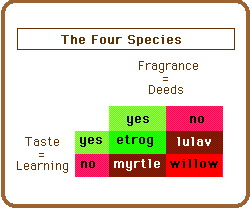
Fragrance
is like good deeds.
Taste
is like learning.
The willow’s long leaves have neither.
I should weep to be as the willow.
The myrtle has leaves the shape of eyes.
May my deeds lead me to focus my sights on learning.
The lulav is straight and tall as my spine.
May my studies give me the courage to act in good faith.
Flavor and aroma join in the etrog.
May my studies and actions support one another;
I will appreciate and build on the unity of creation.
Each has a shape that reminds me of a part of my body.
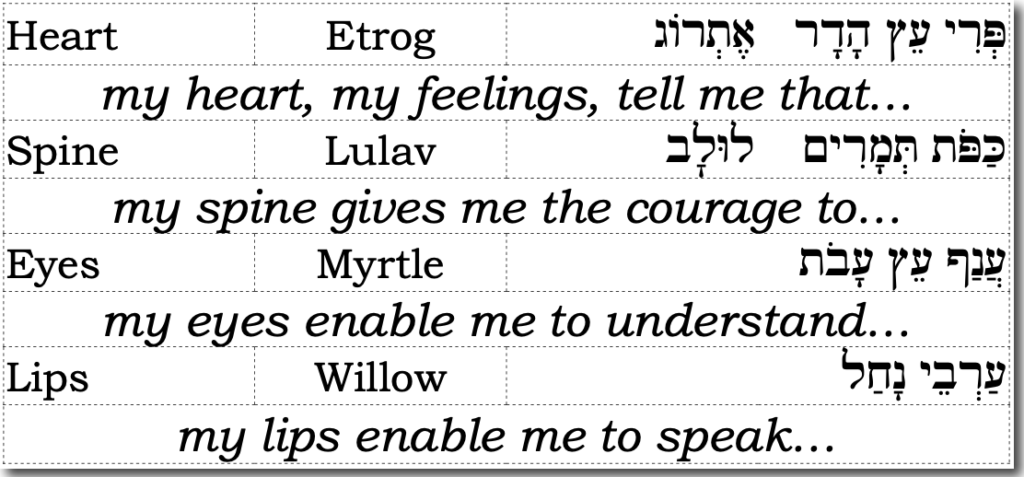
I shake the bouquet in the six directions (beneath, above, left, behind, right and front) so that in all the ways I move I may focus my feelings actions, understandings, and words. May they be as one in their intent and purpose.
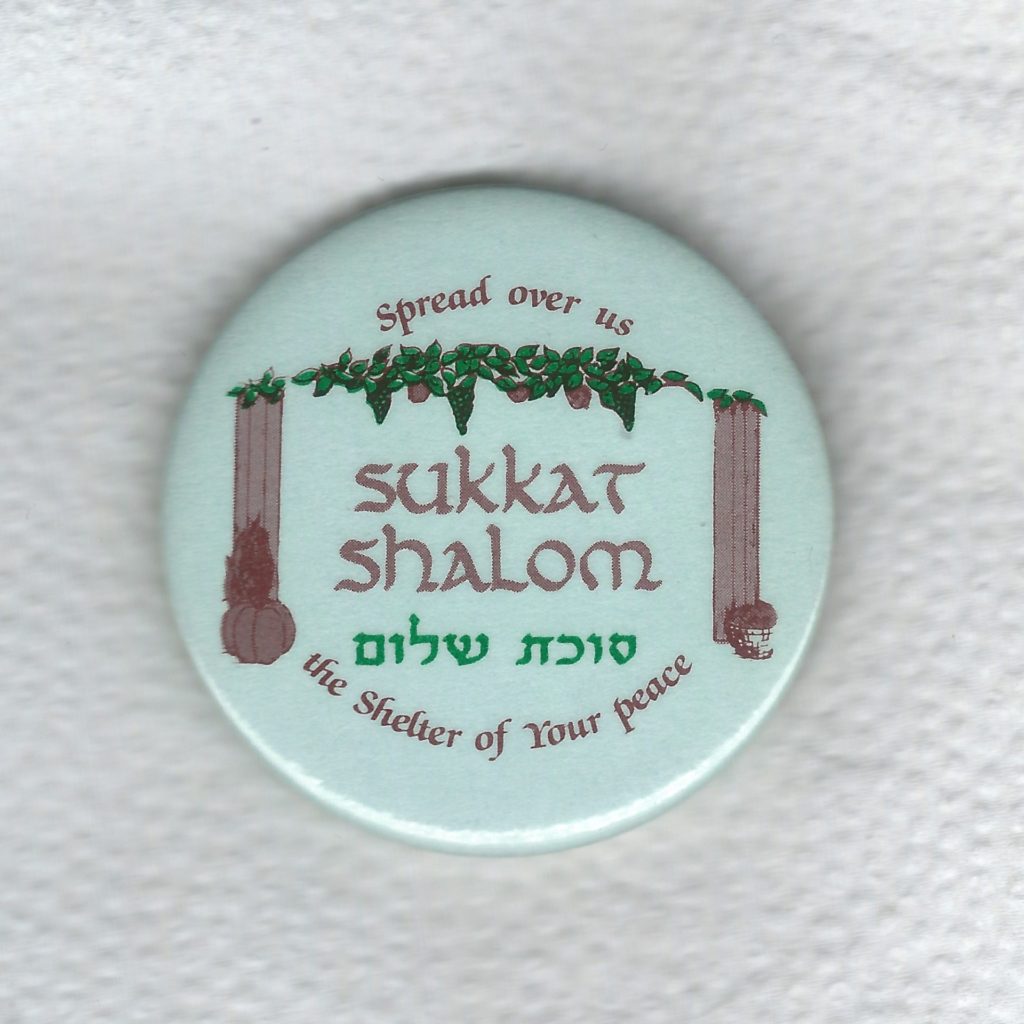
| Date: | ? |
| Size: | 5.6 |
| Pin Form: | clasp |
| Print Method: | celluloid |
| Text | Spread over us sukkat shalom סוכת שלום the Shelter of Your peace |
your lapel buttons
Many people have lapel buttons. They may be attached to a favorite hat or jacket you no longer wear or poked into a cork-board on your wall. If you have any lying around that you do not feel emotionally attached to, please let me know. I preserve these for the Jewish people. At some point, they will all go to an appropriate museum. You can see all the buttons shared to date.

